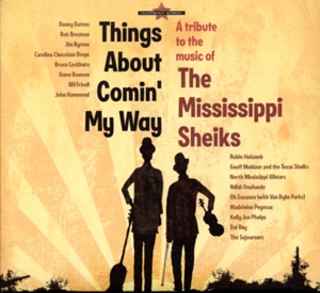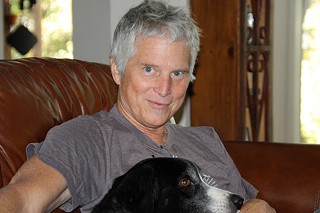Sheik to Sheik
Geoff Muldaur's Texas Sheiks saddle up Stephen Bruton's other final ride
By Margaret Moser, Fri., Feb. 19, 2010

The caption below one photo of Geoff Muldaur on the NPR website reads gospel enough: "Geoff Muldaur originally recruited his bandmates to record a song for a planned Mississippi Sheiks tribute record, but eventually decided to expand the project into a celebration of traditional American music."
"What?" cries Geoff Muldaur over the phone. "No, no, no, no, no! Not even close! That's backwards!"
The triangle starts in the Deep South, down inside the muddy Delta in the 1920s, with a string band known as the Mississippi Sheiks. Forty years later, the line aims north to the East Coast and the siren call of folk music luring from the hinterlands young pioneers such as Carolyn Hester (see "Double-Barrel Beautiful," Dec. 19, 2008) from Texas and Robert Zimmerman from Minnesota. A youthful Geoff Muldaur, born in Pelham, N.Y., also responded.
At the same time, crossing back down to the Southwest, a young banjo player named Stephen Bruton is mesmerized by old string bands and their new acolytes, so he takes a bus from Texas to the Newport Folk Festival to meet Geoff Muldaur. So began the two guitarists' lifelong friendship and musical dialogue. At the twilight of the former – in a nod to the Mississippi Sheiks – 2009's Geoff Muldaur & the Texas Sheiks brought the latter to fruition.
Muldaur's musical veracity ranks him with the finest of his kind, and his response to the news of Bruton's cancer was to engage his friend in the very thing that brought them together. The local's knowledge of his prospects gave his last two projects a particular bittersweetness. Writing the soundtrack of Crazy Heart with his Fort Worth childhood friend T Bone Burnett gave Bruton the national profile in contemporary Americana that he'd earned decades previously by right-hand-manning it with Kris Kristofferson and Bonnie Raitt. Muldaur's Texas Sheiks returned Bruton to his earliest music interests and idols. By inviting him and a handpicked group of musicians to record, Muldaur provided the Austin icon with an epitaph of timeless pleasure.
Sheik Mystique
Any story of the Texas Sheiks should of course begin with the Mississippi Sheiks, yet it's fair to suggest that the latter's relevance really begins amid the folk scene of the early 1960s and that era's attendant revival of and appreciation for string bands, jug bands, and other forms of acoustic music. Enter Geoff Muldaur.
Muldaur found himself conveniently located in his native New York during the fertile days of well-documented folk-rock scenes in Woodstock and in Boston/Cambridge. A founding member of the legendary Jim Kweskin Jug Band in 1963 (see "Jim Kweskin"), he and the group were the antidote to earnest trios and Joan Baez wannabes seen weekly on Hootenanny, using kazoos, washboards, guitars, and a love for ragtime, blues, and country music to battle weary protest songs and innocuous folk anthems.

"We used to go to Austin in the old days, when [Kenneth] Threadgill was still singing behind the bar," Muldaur reminisces. "When I drove across the country with Maria [Muldaur] and Mel [Lyman] – '64, '65 – we'd heard about Threadgill's, so we snuck into his bar with some instruments. He didn't know what was gonna happen, and all of a sudden, we start playing Jimmie Rodgers tunes. He went berserk. Came out from behind the bar and sang with us."
Muldaur's informed style and musicologist's love for traditional music also worked well for Paul Butterfield's Better Days in the mid-1970s, after which he dropped out of the live and touring scene and made music to please himself. His music also pleased others: His arrangement of "Brazil" inspired and was featured in Terry Gilliam's film. Muldaur's acclaimed exploration of the works of jazz cornet player Bix Beiderbecke on Private Astronomy in 2003 marked his return as a player. It also fired his appreciation for the origin of regional sounds.
"I've been trying to tell the world about Texas [mystique]. For some reason, something happened in Texas and Oklahoma where people forgot the barriers between blues and jazz and secular music and Tin Pan Alley and everything else. The Texas musician seems to have more things in his kit than others have. When you throw this stuff to the English blues players, they don't know what to do with it. It's because there are these inside changes only done by the initiated.
"This Texas thing is serious. Out of these songsters, how do you produce Blind Lemon Jefferson? He was like Mozart! Unbelievable! There are so many things going on, it's as if he played piano as a kid and learned Scott Joplin.
"Blind Willie Johnson, Lightnin' [Hopkins], Mance Lipscomb ... Texas can claim most of Leadbelly. The Delta thing was more limited musically. It had great geniuses involved in it, but it certainly wasn't as structured and deep as musically as Texas."
Intelligent String Band Music From the Black South
"It was a running joke with Stephen for 20 years: 'How good could [Texas] be? You don't even have sheiks, for God's sake!' We were always scheming to do something like this and then Stephen got sick. I called our friend [producer] Roger Kasle and said, 'Why don't we get in the studio and give Stephen something to do?' So Stephen would come over between chemo sessions, and he would play this intelligent string band music from the black South."
Pure coincidence that the Mississippi Sheiks became the subject of a tribute CD not long after the Texas Sheiks convened. Formed during the mid-1920s in Jackson, Miss., Walter Vinson, Lonnie Chatmon, Bo Carter, and Sam Chatmon crossbred country and blues with fiddle and guitar into a sound that captured America's fancy. In 1930, their Okeh recording of "Sittin on Top of the World" became a million-seller. Over the next five years, they also recorded for the Bluebird label and left more than five dozen songs in their treasured repertoire.
What made October's Things About Comin' My Way: A Tribute to the Music of the Mississippi Sheiks work is that none of the participating players tried to fix songs that weren't broke, like the Carolina Chocolate Drops' loping, fiddle-and-banjo cover of the title song. For some of the performers, like John Hammond, the Sheiks' stripped-down sound isn't much of a stretch. In the case of former Bad Liver Danny Barnes and the North Mississippi Allstars, however, the Sheiks' rural exotica was transformative. To Geoff Muldaur & the Texas Sheiks, whose nearly completed sessions yielded "The World Is Going Wrong" to Things About Comin' My Way, the Mississippi Sheiks were divine inspiration.

"I'm miserable at listening to singer-songwriters, because I'm not interested in the music, and I don't listen to the words," states Muldaur. "Zero. I come at it from the music. If the lyrics hold up, if the music is compelling, I might listen to words – if they're spectacular and draw me in. Take 'Gee Baby, Ain't I Good to You,' as an example. 'Love makes me treat you the way I do. Gee, baby, ain't I good to you.' That's it."
Hired Musical Guns
As the first-call steel player in Austin and a veteran of bands such as Asleep at the Wheel and Van Morrison, Cindy Cashdollar calls herself one of Muldaur's "hired musical guns."
"To me, jug band music is just another form of American roots music, just like Western swing, where you can hear the influence of other genres in it," explains the handsome blonde instrumentalist. "You can hear acoustic blues, you can hear big band swing, a little Tin Pan Alley, a little jazz.
"Geoff and Bruce [Hughes] put it together as a way of getting Stephen's mind off his treatments," Cashdollar reveals. "It was something he'd wanted for quite some time. I'd worked with Stephen before – a joy in the studio, so smart, so musical. The music kept him going. This and the Crazy Heart soundtrack. Treatments be damned, he was gonna show up at the sessions. One day he drove straight from treatment to the studio, and he looked amazing."
Hughes, a foundational local bassist who shared countless Sunday nights at the Saxon Pub with Bruton as part of the Resentments, says his guitarmate loved recording the Texas Sheiks album in Austin, at Wire Recording with Stuart Sullivan as engineer. He mentions another South Austin music staple who died of cancer, percussionist Mambo John Treanor.
"I remember when Mambo got to the end," says Hughes. "He was struggling so hard, it was heartbreaking. We were onstage because he wanted to play. We took a break and said, 'Mambo, you don't have to do this if it's a burden.'
"Mambo looked at us and said: 'You don't understand, I have to do this. It's the only thing keeping me alive.' So, we said, 'Fuck yeah, we gotta do it.'"
And so it was for the Sheiks working with Bruton. Sullivan's studio served as home to the project, its roomy, casual layout conducive to the intimacy Muldaur believed the project needed and the location coincidentally yet crucially close to Bruton's home.
"As time went on, it became more apparent that if we wanted Stephen involved, we had to do it in Austin," explains Muldaur in a somber tone. "Stephen was undergoing treatment, and it was pretty rough. I knew we needed a big live room so we could all play in the same room. Stuart's was the only place I thought we could capture it in a real in-the-round situation."
Besides Hill Country bluesman Johnny Nicholas ("I knew he was slippery and evil-sounding, and I love the way he sang") and Cajun fiddler Suzy Thompson, Muldaur brought in a ringer for the sessions, Jim Kweskin, whose presence gave the recording a cachet that would have tickled Bruton. Kweskin's geniality and expert finger-picking guitar style added as fine a nuance as Floyd Domino's piano, another local touch. Hughes wasn't slated to co-produce Texas Sheiks but found a kindred spirit in Muldaur.
"When Geoff recontacted me, he said, 'I don't know that many people in Austin, but I've talked to Stephen, and I'm putting together this project, and Stephen said I should call you,'" recounts Hughes.
"Probably what really happened is Geoff called up Stephen and said, 'I'm looking for a studio, and I'm looking for this and looking for that,' and Stephen finally said: 'I've got an idea. Call up Bruce and bug him because I don't have the time.'"
Something Immutable
Geoff Muldaur & the Texas Sheiks arrived just months after Bruton joined the big string band in the sky. That the project ever came about was a miracle in itself; its timing with the Mississippi Sheiks tribute was uncanny. To Bruce Hughes, the influence of acts such as the Mississippi Sheiks demands more than just cursory acknowledgement.
"There's something immutable in these players," he muses. "Classically trained they're not, but real musicians they most definitely are. There's something volcanic about it. There's hardly any head in the music and all heart. For the people that were the precursors of the rock & roll era, there's that sense of danger in music that you feel when you hear someone sing from the bottom of their soul. 'Times are hard; woman's gone.' The value is that the feeling is real."
Muldaur has now been playing dangerous music for more than five decades with fervor and dedication that still drives him. The Texas Sheiks was his chance to play as a believer among true believers once again.
"I don't ever reproduce. This is the closest I come. I tend to do things a little different than they were done originally, because I don't want to be compared to originals. If I get anywhere near what they're doing, I make sure it's awful good. Because I don't want to be a cover band. If I can't mix it up a little bit, I don't want to do it.
"But what we brought back was the spirit of the music. I knew Stephen as an up-and-comer and suddenly he was doing things with Kristofferson," Muldaur marvels. "That's why I liked the Resentments. It was a constant creative situation. He did a lot of boom-chik, boom-chik in his life, and it used to bother me because I knew he was so great. He wanted that world, and he got it, with wonderful friends. But I was always pushing him like, 'C'mon, Stephen, let's do something no one will buy!'
"Stephen brought people together like that; that's what his thing was."
Geoff Muldaur & the Texas Sheiks pay tribute to Stephen Bruton at the Austin Music Awards, Saturday, March 20.









